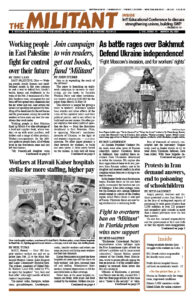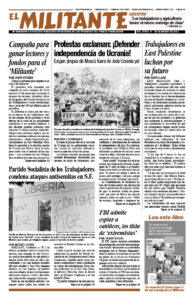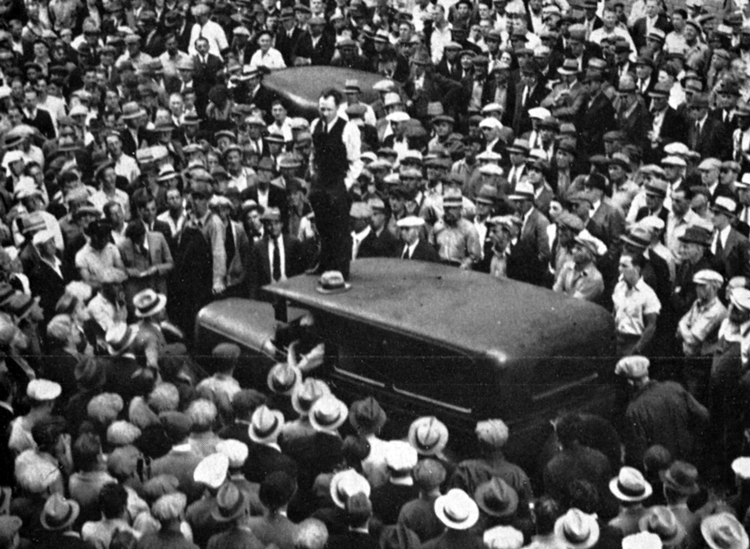Speeches to the Party: The Revolutionary Perspective and the Revolutionary Party by James P. Cannon is one of Pathfinder’s Books of the Month for March. Cannon, then national secretary of the Socialist Workers Party, explained the prospects for working-class revolutionary struggle, answering the U.S. rulers’ boasts of perpetual domination following their bloody victory in the second imperialist world war. The excerpt is from the SWP’s 1946 basic programmatic document, “Theses on the American Revolution.” It helps explain why, even as the power of U.S. imperialism wanes today, the working-class battle to take political power here remains decisive. Copyright © 1973 by Pathfinder Press. Reprinted by permission.
The United States, the most powerful capitalist country in history, is a component part of the world capitalist system and is subject to the same general laws. It suffers from the same incurable diseases and is destined to share the same fate. The overwhelming preponderance of American imperialism does not exempt it from the decay of world capitalism, but on the contrary acts to involve it ever more deeply, inextricably, and hopelessly. U.S. capitalism can no more escape from the revolutionary consequences of world capitalist decay than the older European capitalist powers. The blind alley in which world capitalism has arrived, and the U.S. with it, excludes a new organic era of capitalist stabilization. The dominant world position of American imperialism now accentuates and aggravates the death agony of capitalism as a whole. …
The role of America in the world is decisive. Should the European and colonial revolutions, now on the order of the day, precede in point of time the culmination of the struggle in the U.S., they would immediately be confronted with the necessity of defending their conquests against the economic and military assaults of the American imperialist monster. The ability of the victorious insurgent peoples everywhere to maintain themselves would depend to a high degree on the strength and fighting capacity of the revolutionary labor movement in America. The American workers would then be obliged to come to their aid, just as the Western European working class came to the aid of the Russian Revolution and saved it by blocking full-scale imperialist military assaults upon the young workers’ republic.
But even should the revolution in Europe and other parts of the world be once again retarded, it will by no means signify a prolonged stabilization of the world capitalist system. The issue of socialism or capitalism will not be finally decided until it is decided in the U.S. Another retardation of the proletarian revolution in one country or another, or even one continent or another, will not save American imperialism from its proletarian nemesis at home. The decisive battles for the communist future of mankind will be fought in the U.S.
The revolutionary victory of the workers in the U.S. will seal the doom of the senile bourgeois regimes in every part of our planet, and of the Stalinist bureaucracy, if it still exists at the time. The Russian Revolution raised the workers and colonial peoples to their feet. The American revolution with its hundredfold greater power will set in motion revolutionary forces that will change the face of our planet. …
The American workers have the advantage of being comparatively free, especially among the younger and most militant layers, from reformist prejudices. The class as a whole has not been infected with the debilitating poison of reformism, either of the classic “Socialist” variety or the latter-day Stalinist brand. As a consequence, once they proceed to action, they more readily accept the most radical solutions. No important section of the class, let alone the class as a whole, has been demoralized by defeats. Finally, this young and mighty power is being drawn into the decisive phases of the class struggle at a tempo that creates unparalleled premises for mass radicalization. …
It is true that this class, in many respects the most advanced and progressive in the world, has not yet taken the road of independent political action on a mass scale. But this weakness can be swiftly overcome. Under the compulsion of objective necessity not only backward peoples but backward classes in advanced countries find themselves driven to clear great distances in single leaps. As a matter of fact, the American working class has already made one such leap which has advanced it far ahead of its old positions.
The workers entered the 1929 crisis as an unorganized, atomized mass imbued with illusions concerning “rugged individualism,” “private initiative,” “free enterprise,” “the American Way,” etc., etc. Less than 10 percent of the class as a whole was organized on the trade union field (fewer than 3 million out of 33 million in 1929). …
As a consequence, the 1929 crisis found the working class helpless and impotent. For three years the masses remained stunned and disoriented by the disaster. Their resistance was extremely limited and sporadic. But their anger and resentment accumulated. The next five years (1933–37), coincident with a partial revival of industry, witnessed a series of gigantic clashes, street fights and sit-down strikes — an embryonic civil war — the end result of which was a leap, a giant leap, for millions of workers from nonexistence as an organized force to trade union consciousness and organization. Once fairly started, the movement for unionism snowballed, embracing today almost 15 million in all the basic industries.
In one leap — in a brief decade — the American workers attained trade union consciousness on a higher plane and with mightier organizations than in any other advanced country. … Under the impact of great events and pressing necessities the American workers will advance beyond the limits of trade unionism and acquire political class consciousness and organization in a similar sweeping movement. …
Given an objectively revolutionary situation, a proletarian party — even a small one — equipped with a precisely worked out Marxist program and firm cadres can expand its forces and come to the head of the revolutionary mass movement in a comparatively brief span of time. This too was proved conclusively — and positively — by the experiences of the Russian Revolution in 1917.


